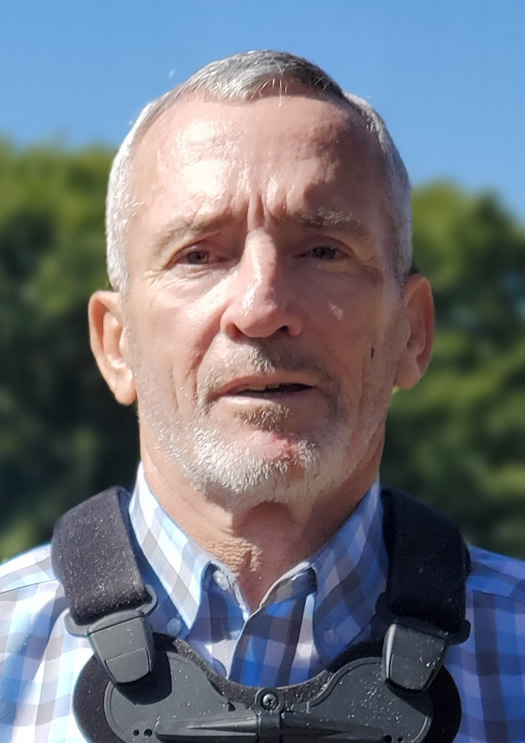Raising deer for legalized hunting is no easy task. But 59-year-old Michael Williams is used to hard work and manual labor. The former high school wrestler and retired rodeo bull rider knows firsthand how grueling work takes a toll on the body. He went through more than a dozen back surgeries over the years with little to no relief. His spine eventually became deformed.
“I was in so much pain and slumped over so bad, I was ashamed to be around people,” Williams said. “At one point, I didn’t even leave the house, unless it was absolutely necessary.

But today, Williams is walking tall and upright, all because of a specialized spinal procedure offered at Texas Health Harris Methodist Hospital Fort Worth.
Addressing spinal deformities in children and adults, the pedicle subtraction osteotomy is a complicated surgical procedure that allows a neurosurgeon to strategically reshape the vertebrae to realign a deformed spine. Cyrus Wong, M.D., a neurosurgeon on the Texas Health Fort Worth medical staff, said the intricate surgery requires a specialized clinical team, which includes the neurosurgeon, anesthesiologist and several scrub technicians and OR nurses.
“The 9-hour surgery involved 21 titanium screws and four rods along Michael’s lower spine, during which he was corrected from a painful, constantly bent over position to standing upright with well-balanced posture,” said Wong, who is also a member of North Texas Neurosurgical & Spine Center, a Texas Health Physicians Group practice.*
Before meeting Wong last summer, Williams was enduring chronic back pain for more than two years. Raising white-tailed deer for a local ranch near Glen Rose, Williams interacted constantly with wild animals.
“Back in 2016, one of the deer broke out of the corral and started charging behind me. I was hit square in the back and knocked unconscious,” Williams said. “That’s where my story really begins.”
Wracked with pain, Williams endured close to 14 back surgeries, taking place all across North Texas. Some were supposed to address his initial back injury from the deer incident, and some unfortunately included corrective back surgeries.
In July 2019, Williams, slumped over using a walker, shuffled slowly into Wong’s Texas Health Fort Worth office. According to Williams, that’s when his miracle began.
“Dr. Wong told me he was going to try and get me to stand straight again. But it wasn’t what he said, it was how he said it. It gave me the comfort and hope that I needed,” Williams said.
Wong performed several diagnostic studies, which included MRI and CT scans, along with physical exams. Williams was diagnosed with scoliosis — a sideways curving of the spine — and flatback syndrome — a condition where the lower portion of the spine loses its normal curvature.
“When you have flatback syndrome, you’re in constant pain and disability, you have difficulty standing up or looking straight, and your daily activities are hindered or simply become non-existent,” Wong said. “Michael’s center of gravity was completely off, causing him to lean forward by more than 10 inches every time he attempted to stand or walk.”
Wong performed the pedicle subtraction osteotomy on July 30, 2019, at Texas Health Fort Worth.
“The day after surgery, a nurse came to my room and said I needed to start walking. I told her she’d lost her mind,” Williams said. “Eventually, I got out of bed, but I didn’t feel any pain. I walked up and down the hallways near my room, and I didn’t want to stop.”
And he hasn’t.
“His constant state of back and neck pain no longer exists,” Wong said. “He’s a man living life and enjoying every minute of it, and from a medical standpoint, that’s the exact outcome we want to see.”
Today, Williams is undergoing physical rehab at a facility near his home in Glen Rose and gaining more strength each day.
“When you’ve been through all the pain and surgeries I’ve been through, and suddenly walking with no pain a day after major surgery, that’s what I call a miracle.”
Learn more about Texas Health Fort Worth’s comprehensive back and spine care, and neurosurgical treatments.
*Physicians employed by Texas Health Physician Group practice independently and are not employees or agents of Texas Health Resources hospitals.
Related News
About Texas Health Resources
Texas Health Resources is a faith-based, nonprofit health system that cares for more patients in North Texas than any other provider. With a service area that consists of 16 counties and more than 8 million people, the system is committed to providing quality, coordinated care through its Texas Health Physicians Group and 29 hospital locations under the banners of Texas Health Presbyterian, Texas Health Arlington Memorial, Texas Health Harris Methodist and Texas Health Huguley. Texas Health access points and services, ranging from acute-care hospitals and trauma centers to outpatient facilities and home health and preventive services, provide the full continuum of care for all stages of life. The system has more than 4,400 licensed hospital beds, 6,400 physicians with active staff privileges and nearly 29,000 employees. For more information about Texas Health, call 1-877-THR-WELL, or visit www.TexasHealth.org.
